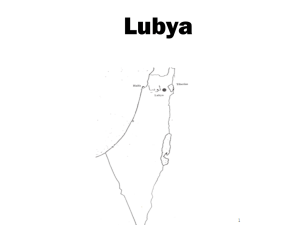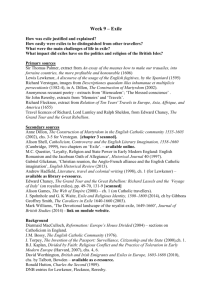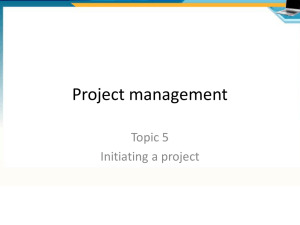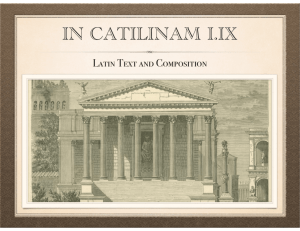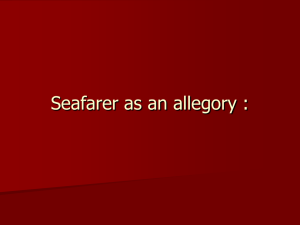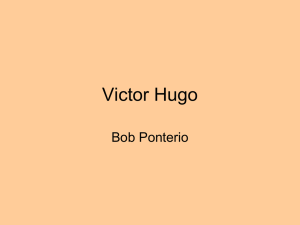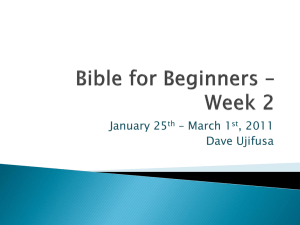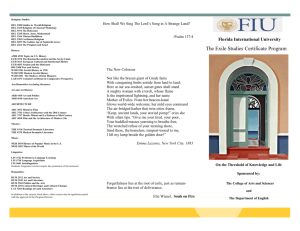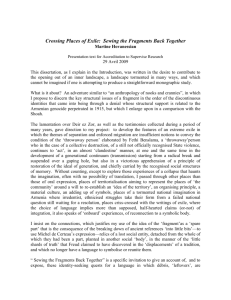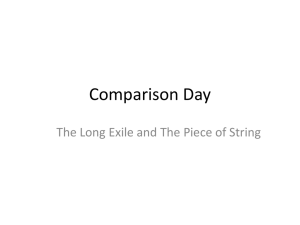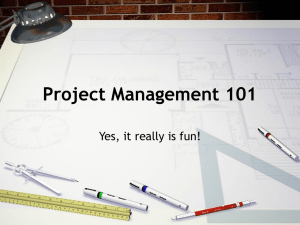project management by: prof. b.o. ker.
advertisement
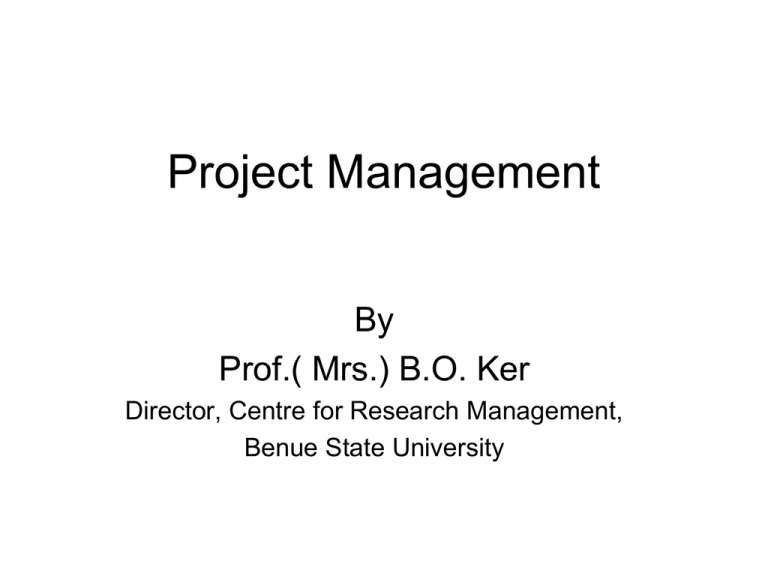
Project Management By Prof.( Mrs.) B.O. Ker Director, Centre for Research Management, Benue State University 1.0 Project Defined Definitions A project: • is a Temporary endeavour with a beginning and an end • Creates a unique product, service or result • Is progressively elaborated and distinguishing characteristics of each unique project will be progressively detailed as the project is better understood • Is a time based activity To be successful a project needs specific planning, organization and execution A project has to fulfill its set aims and objectives within a limited period of time with limited fund, personnel and other resources. 2 Characteristics of a Project • A means to bring about change • Has a definite beginning and an end (once the project objectives or deliverables are achieved, the project ends), • Project objectives or deliverables should be SMART i.e.– – – – – Specific Measurable Achievable Realistic Time-bound 3 Characteristics of a Project…. • Has high risks (could fail due to different factors acting independently or in combination). • Is about doing something new/ novel (which means new approaches and means of doing things have to be developed). • Human and material resources are always involved. • Time, Cost and quality are always constraints to varying degrees. 4 Project Management Defined • Project Management is: The art of managing projects with the specific objectives of: – Ensuring that the project objectives are realized – Ensuring that projects are delivered on schedule – Ensuring that projects are delivered within budget. • The Application of knowledge, skills, tools and techniques to project objectives (activities) to meet stakeholders’ needs and expectations. 5 Why Project Management? • • • • Because Project delivery is influenced by many factors, it is crucial to mange it. Such management requires Technical and Managerial Skills, Tools, Clarity of concept and Resource Management (Resource comprises money , Man, machine and other Materials). A project that lacks proper management comes out often with technical faults too major to be ignored. Lack of proper management may lead to misuse of project funds resulting in inability to complete the project. 6 Project Management The “Triple Constraint” The Project Manager / the researcher has certain constraints to battle with in delivering a project. These are referred to as “The Triple Constraint”. They include: – – – – – – – – Scope Management Cost Management Time Management Quality Assurance Human Resource Management Communication Management Risk Management Conflict Management among others. RESOURCES PROJECT CONSTRAINT TRIANGLE 7 The “Triple Constraint”….. A change to a component of the Triple will usually affect other components. Therefore careful analysis of a move to make a change is necessary in order to assess the impact of the change to avoid negative effect on the project. 8 SCOPE • The scope involves the range of tasks required to accomplish programme goals. ( it constitutes the process to ensure that the project includes ONLY all the work required to complete the project successfully). • The scope is one of the three main elements that must be kept in balance in the project constraints triangle. 9 Resources These include: • The personnel • The equipment needed to achieve the aims of the project • These essential elements will create expenditure and are dependent on the project budget. • Funds given is fixed for the whole project period as well as the budget and availability of resources. • Any increase after budget approval and commencement of project will be taken care of by the applicant or a complementary funding elsewhere. 10 • Project Schedule – Indicates the time and sequence of the various tasks as well as the total project duration. – While the time can be modified slightly according to varying needs, the funding can not (i.e. an extension of a few months for completing the outcomes of the project can be requested. * What we must note is that no project works exactly according to the initial plan. Successful project management is a process of continuous planning and revision as shown11 below Defining Aims Planning Controlling Deciding Implementing 12 3.0. Project Management Processes • Project Management Processes describe what you need to do to manage a project. • They Include: – – – – – Project Definition /Initiation- beginning the cycle Project Planning Project Execution – you do Project Monitoring and control – you check and act Project Closure – End the cycle 13 Project Definition/ Initiation • The success of a project depends on the clarity of its definition. • Project goals have to be clearly defined to specify what is hoped to be achieved on the completion of the project. • Project initiation processes formally start a new project or project phase. • The output of project initiation is The Project Charter or Project Initiation Document. The other output is Preliminary Scope Statement. 14 Project Initiation .. • The project initiation precedes the planning phase. • Its output should serve as basis for management to decide if the project should go ahead or not. • Where project initiation is not done properly, such projects experience high risk, extra cost, major corrections and at worse complete failure. • The Project Charter should answer to the 5Ws of which are What? Why?, How?, When?, Who? of the project. 15 Planning Process • This involves making a plan to manage the project. • It determines if the Project Charter can or cannot be done and how it will be achieved. • It gives a clearer definition to the Project Scope • Results in a Project Management Plan (PMP) • In the planning process everyone’s involvement is essential. • Input from stakeholders is essential • Review of related literature from previous projects, magazine articles, documentaries, etc are vital in planning the project at hand. • Planning process should be iterative (constantly reviewed). 16 Features of Planning Process • • • • • • • • • Work Break- down Structure (WBS) Time Allocation Critical Path Analysis Resource allocation Resource Leveling Project Network Diagram Time scheduling Cost estimating Risk Analysis 17 Project Execution • Refers to doing the tasks identified in the plan • Execution stage- the turning of theory into practice, the Project Management Plan is turned into reality. • All activities in the executive phase are geared towards achieving the project objectives or deliverables. • Review may be carried out if there is need in order to achieve desired quality. 18 In the Execution Stage.. • Involvement of the Project Leader/ Researcher/Manager and Project Team is core. • It calls for close Monitoring and Controlling which are key tasks that could make a project fail or succeed. 19 Tasks involved in Project Management • • • • • • Planning the whole project Organizing the project Building and leading a team (if any) Organizing and chairing meetings Monitoring and evaluation Administering and managing budget 20 Planning the Project • Project planning is an intergral part of the application to carryout a project. • The plan continues to be refined • Planning is therefore required throughout the life time of the project. • General aims and objectives have to be defined and translated into concrete outcomes, products, services and impacts • The major steps which lead to the development of the product(s) have to be packaged and timed in a work plan. 21 Work Plan Project One Thesis with timelines Following is a Introduction: I will write this after finishing the chapters below to discuss sketch of the intro: the intellectuals’ contexts, issues of translated texts etc. Chapter 1 : ‘Exile’ and Intellectual Practice: 1st year ,I argued that Said’s ‘exile’ is paradoxical, because with the pain of exile comes the pleasure of a critical intellect that ‘speaks truth to power’. Chapter 2 : ‘Exile’ as Resistance: year 2, Here I analysed how the convergences and divergences of Mahfouz, Darwish and Saadawi’s ‘exilic’ thoughts created diverse resistances. Chapter 3 : Writing as an ‘Exilic’ ‘Home’: year 3, I will accomplish this chapter that asks if ‘writing’ is the shelter where the ‘exile’ flies ‘after the last sky’, to borrow a phrase from Darwish. Chapter 4 : ‘Exile’ in the Context of Post-colonialism/Post-modernism: year 4, I will conclude the thesis by including this chapter. Here I will ascertain if the discourse of the ‘exile’ is part of post-colonialism and examine what relationship the ‘exile’ forms with post-modernism and cultural studies. 22 Work Plan Project Two The research is divided into three stages • The first stage involves; 1. Literature study 2. Study and analyze threats classification based on use/misuse case model 3. Model the interactions between threats, safeguards and assets on a detailed and realistic level. • The second stage involves: 1. Build safeguard ontology 2. Extend the ontology to a broader scope for general utilization in trustworthy systems 23 • The third stage involves: 1. Integrate the ontology with risk analysis and management tools 2. Final thesis writing and publications I specifically chose the present institute of study because as at the time I applied there are projects on ground in my area of research interest. 24 Project Timeline and Tasks Task – Week April May June July August Number 1 2 3 4 1 2 3 4 1 2 3 4 1 2 3 4 1 2 3 4 1) Correction of deficiencies in database 2) Classification of functional groups 3) Data analysis and interpretation 4) Manuscript writing 5) Manuscript revision 6) Manuscript submission 25 Financial Details Budget Total estimated costs: (in Swiss francs - CHF) Tuition & Fees ____________________ Accommodation & Subsistence CHF_3500_______________________ Travel _CHF2000_______________________ Books and Materials _CHF3000_______________________ Other* ________________________ Total costs: ==CHF8500====================== Amount requested from IFUW: ===CHF8500===================== • Please give details of the "other" costs listed above, if any: 26 BUDGET B A. • • • • • • • • • • • • • • • • • • • • • Equipment/Materials 1. 2. 3. 4. B. 1. 2. 3. 4. 5. C. 1. 2. D. N K Twenty five(25) Stalls @ N1,500 per month x 12 450,000.00 Fifty(50) Inosan Plastic Chairs @ N1,550 77,500.00 Twenty five(25) portable coolers @ N2,000 50,000.00 Twenty five (25) Ceiling fans @ N4,500 112,500.00 Sub-total = 690,000.00 Administration Registration of Cooperative Society with the Corperate Affairs Commission 150,000.00 Purchase of Accounting manuals/books 20,000.00 Opening of individual women bank account and bank account for the Cooperative Society 50,000.00 Transportation for Project Team to and from project site 50,000.00 Honorarium for the Leader of the Women Group 20,000.00 Sub-total = 290,000.00 Others Final Report on the Project including video clips, pictures etc 50,000.00 Contingency 50,000.00 Sub-total = 100,000.00 Grand Total = A: 690,000 , B :+ 290,000 C + 100,000 = 1,080,000 /150= $7,200 Organizing the Project • Organisation of the project is the realisation of the planning process-getting things going. • It involves specific tasks: -The different roles and responsibilities within the project should be allocated according to individual strengths and expertise. • -setting up and maintaining communication system, info & reporting system, managing critical phases 28 Organising and chairing meetings • Meetings play important part to successful project • Meetings are to be organised in a professional way. • Communication during meetings should be carefully planned. • Should take into account cultural dimensions if any. 29 Monitoring, Controlling and Evaluation • If quality is to be achieved permanent monitoring, controlling and Evaluation of the project are essential. – Tasks involve overseeing the project implementation process – Measuring performance vis-avis project management plan – Defect, correction, preventive actions, approving change and managing change are all carried out. 30 Administering and Managing the budget • Administrative workload, especially financial management must be handled carefully. • Considerable time and energy cab be saved if a transparent reporting system and clear agreement are introduced at the beginning of the project. 31 Benefits of Project Management • It saves time by properly planning the Project and considering all relevant factors which may affect its outcome • It saves money • It leads to a more successful outcome if guidelines are followed • You will enjoy goal clarity • Your resources will be coordinated • Risks will be identified along the line and managed. 32 Practical Exercises 33 Thank you 34
